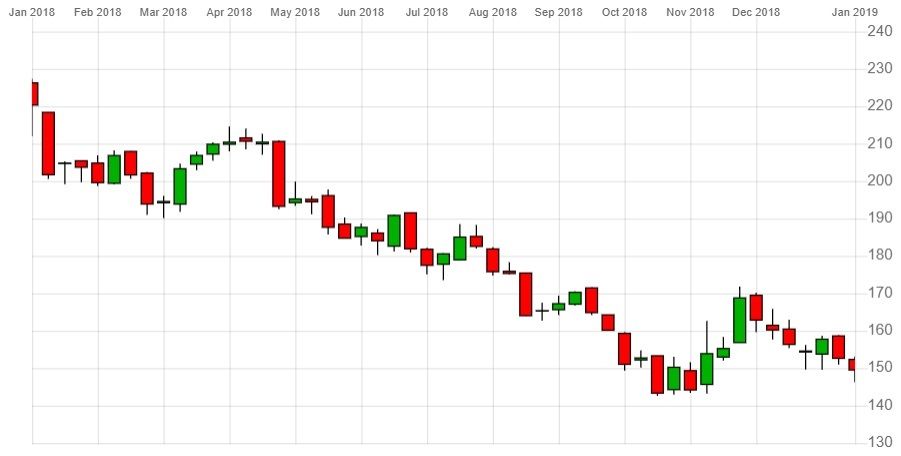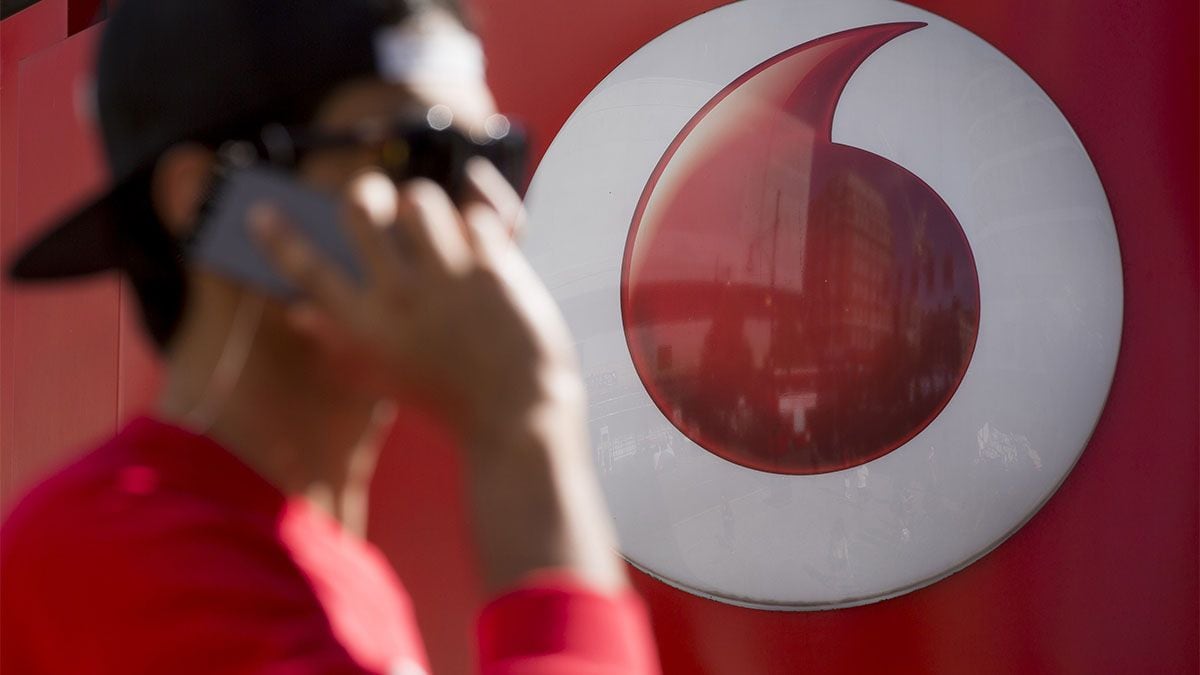Shares in Vodafone [VOD] nosedived 34.18% in 2018, making the FTSE 100’s 9.68% loss seem modest by comparison. Shareholders expecting any slowdown in the stock’s downturn, which has seen it drop 39% in the past five years, will have been bitterly disappointed. Adding insult to injury is the fact that 2017 actually saw the stock jump 24.2%.
Dragging on the share price has been corporate debt, poorly performing acquisitions and a shrinking European business. In response, CEO Nick Read has looked to cut costs and enter into strategic partnerships to grow the world’s second-biggest mobile phone company business.
What happened in Vodafone’s recent earnings announcements?
January’s third-quarter earnings announcement saw revenue drop 6.8% to €10.9bn from the same quarter last year. This was in line with expectations and driven by new accounting practises, the sale of its Qatari businesses and foreign exchange headwinds. Disappointingly, service revenue was down 1.1% across Europe. However, mobile contract churn was reduced and business in emerging markets, with the exception of South Africa, saw growth of 4.9%.
| Revenue % change, Q3 YoY | -6.8% |
| Market cap | £37.45bn |
| EPS (TTM) | -28.20 |
Vodafone stock vitals, Yahoo finance, as at 25 January 2019
This follows November’s half-year results where Vodafone reported operating losses of €6.8bn. Hitting revenue here was the Vodafone India sale and write-downs in Spain. Debt also rose 6% to an eye-watering €32.1 billion as the acquisition of Liberty Global pushed the coffers deeper into the red.
For the full year, Vodafone said it expected organic EBITDA to rise by about 3%. Free cash flow is also expected to come in at €5.4 billion which should be enough to cover debt and dividends payments - both big concerns for shareholders.
What could boost Vodafone’s stock in 2019?
1. Radical streamlining of UK business
Despite having 19 million UK customers, Vodafone’s UK division is considered its “weakest link”. Dwindling mobile phone sales, the acquisition of Cable & Wireless and reputational damage following a botched upgrade have hurt revenues. According to November’s update, service revenue was down 6% and EBITDA had fallen 13%. In response, the division has undergone a radical streamlining, including the closure of loss-making legacy networks and a 6% cut in operational costs.
2. Chat bots help cut costs
Vodafone chief Nick Read sees a big role for digital in minimising costs and improving customer experience.
“We see the emergence of new digital technologies, including big data analytics, artificial intelligence agents and robotic process automation as a compelling opportunity to transform the group’s operating model and fundamentally reshape our cost base,” Read told investors in November.
Already selling handsets and sim-only plans online is intuitive chat-bot TOBi, knocking website checkout times down 47%. Staff cuts are also being made to reduce operational costs in Europe by at least €1 billion, with January seeing 1,200 jobs axed from the Spanish division.
47%
Reduction in website checkout times resulting from introduction of online chat-bot, TOBi
3. Deal with IBM to develop Europe’s 5G and cloud capabilities
Vodafone and IBM have partnered in a new venture to increase Europe’s 5G, A.I. and cloud computing capabilities. Europe is a potentially lucrative market for both companies as penetration in these technologies lags far behind the US and China.
Getting into 5G early could also be more cost-effective than building new masts to cope with Europe’s data addiction as the technology has seven times the capacity of 4G. IBM will also have a new market for its hybrid-cloud technology. The US tech-giant will be putting up $550 million over eight years to see its cloud technology rolled out to all of Vodafone’s business customers.
Is there opportunity in Vodafone’s share price?
RBC recently double-downgraded Vodafone to “underperform” from “outperform”, cutting its price target to 125p from 260p. RBC said that Vodafone has “little financial headroom despite synergies and cross-cutting” and faces the headwinds of hefty 5G spectrum licence costs. The bank also noted that the sale of core infrastructure would only fund the dividend for one year at the current payout. Vodafone hasn’t cut its dividend since it was first introduced in 1990.
Whether the recent deal with IBM and cost-cutting initiatives go far enough remains to be seen. Certainly, Vodafone’s approach to 5G in Europe is encouraging. Europe’s 5G market is set to be worth over $47 billion by 2025, with 84% of the population subscribing to a mobile phone package by 2020. If Vodafone is able to solidify its position here, and get a handle on debt, it could see long-term gains in the share price.
Disclaimer Past performance is not a reliable indicator of future results.
CMC Markets is an execution-only service provider. The material (whether or not it states any opinions) is for general information purposes only, and does not take into account your personal circumstances or objectives. Nothing in this material is (or should be considered to be) financial, investment or other advice on which reliance should be placed. No opinion given in the material constitutes a recommendation by CMC Markets or the author that any particular investment, security, transaction or investment strategy is suitable for any specific person.
The material has not been prepared in accordance with legal requirements designed to promote the independence of investment research. Although we are not specifically prevented from dealing before providing this material, we do not seek to take advantage of the material prior to its dissemination.
CMC Markets does not endorse or offer opinion on the trading strategies used by the author. Their trading strategies do not guarantee any return and CMC Markets shall not be held responsible for any loss that you may incur, either directly or indirectly, arising from any investment based on any information contained herein.
*Tax treatment depends on individual circumstances and can change or may differ in a jurisdiction other than the UK.
Continue reading for FREE
- Includes free newsletter updates, unsubscribe anytime. Privacy policy





